Horses are magnificent creatures that are just as strong as they are beautiful. Their strength and muscle tone make their legs extremely powerful.
Can a horse kick kill you? A horse’s kick can pack the punch of a small car and can severely injure a person standing too close. It can even prove fatal in certain circumstances and it can all happen in a matter of seconds. It is imperative to watch for the warning signs and stay safe when spending time around any horse.
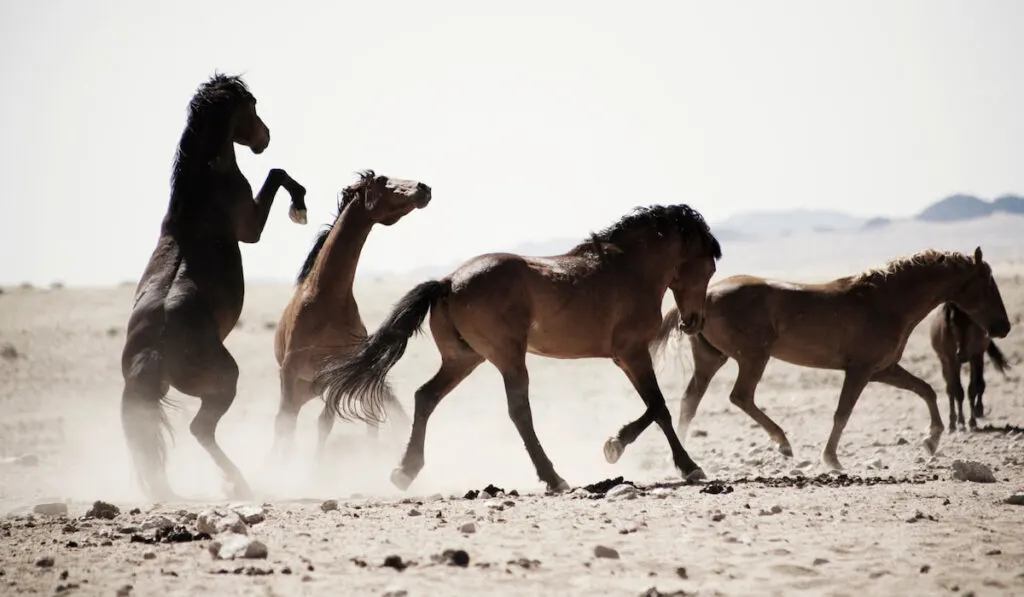
Most horses that are used to being around people aren’t violent towards them, but even a horse that is used to people has the potential to kick if they feel threatened. The best way to keep yourself and others safe around horses is to respect their boundaries and recognize potential triggers so that you can prevent dangerous accidents.
Table of Contents
Are Horses Aggressive?
Horses usually do not tend to be aggressive around their owners, however, it is a good rule of thumb to always keep an eye out for possible threats, even around a horse that you are comfortable with. New horses may be aggressive around people that they do not know. Unless you are aware of a horse’s full history, you may not know the lifestyle they were accustomed to on previous ranches.
Some horses may be specifically fearful of children, or men, or women depending on their past experiences. Either way, anytime you are near a new horse, it is always safe to proceed with caution. Horses are sometimes aggressive with each other, whether it be a horse they know or a new horse that they’ve never been around.
Mares especially may be particularly aggressive towards other mares or studs. They may be aggressive towards other animals that they are unfamiliar with or have had bad experiences around. Either way, any horse has the potential to be aggressive, but that doesn’t mean that they always are. Most displays of aggressive behavior are due to the horse being fearful for some reason or another. The key is to prevent this fear whenever possible.
Reasons Why a Horse Might Kick a Person
Horses typically use their legs to kick as a line of defense to keep potential threats away and to warn something that is getting to close. The fact that a horse kicks does not mean they are inherently aggressive, but if it is aimed towards someone or something, it does mean that they feel threatened. A horse may also just be feeling a little feisty or excited, such as when you let them loose in a pasture, and they may kick as an expression of their excitement.
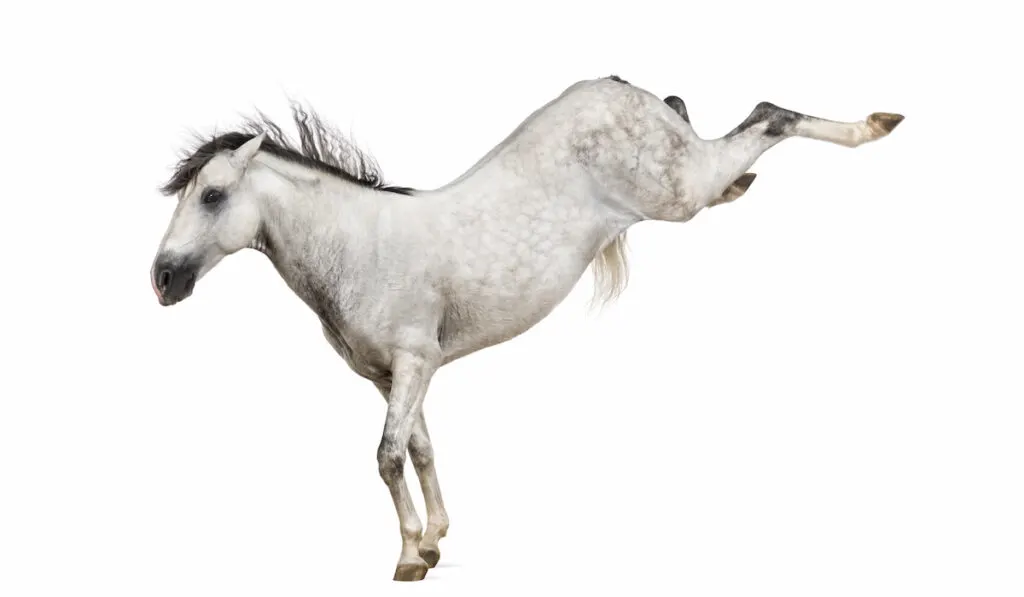
If you are standing too closely, you may accidentally be in the line of fire. A horse might even accidentally kick a person while attempting to kick another horse or animal. Sometimes, however, their kicks will be specifically aimed at a person. In these cases, the reasons may vary.
Perhaps they were unfamiliar with the person or the person moved in an unexpected way. They also could be responding to something you are doing to them, such as trying to cinch a saddle, cleaning their hooves out or giving them a bath. Another reason they could kick a person is that they are in some kind of pain and either they unintentionally kick you or they kick you on purpose, assuming that you are the reason for their pain.
Some horses even kick while eating and if you are in their stalls with them, you could potentially get kicked in the process. It is also very easy to get kicked while being thrown or falling off of a horse. The shock of feeling something behind them or simply kicking while bucking could cause them to kick you unintentionally as you fall to the ground.
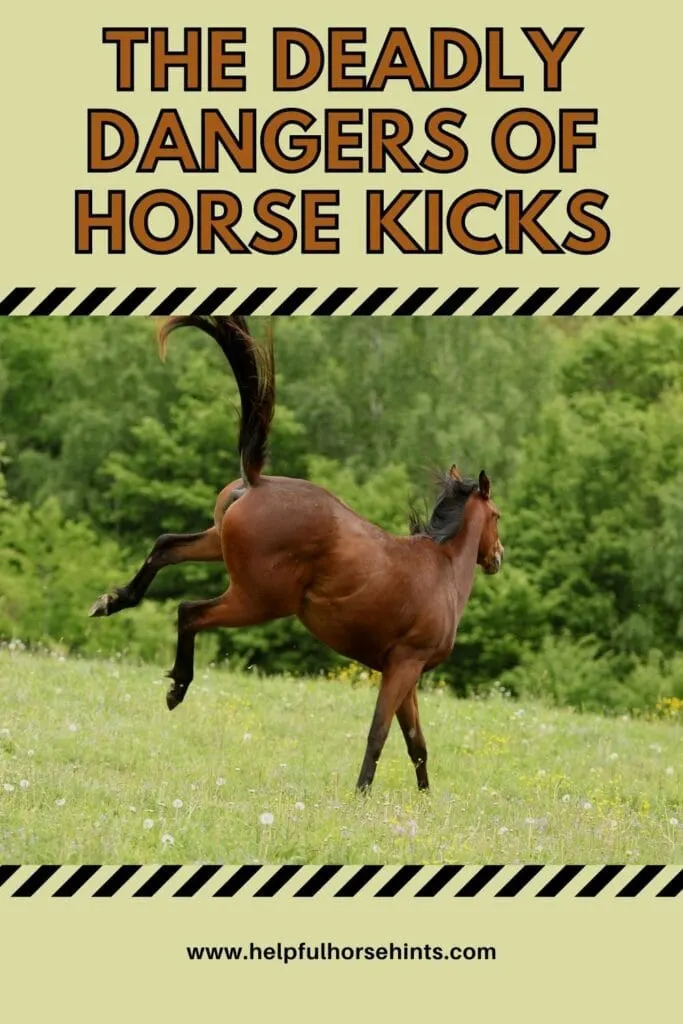
Warning Signs: Things Horses Might Do Before They Kick
A horse will show a few key warning signs before they follow up with a kick. One tell-tale sign that a horse is feeling threatened or frustrated is pinned back ears.
Typically a happy, content horse keeps its ears straight up. When they pin their ears back, flat against their heads, they are warning you that they are angry or feel upset. They may also begin repeatedly swishing their tails. If they continue to feel threatened, they may shift their weight to one leg and lift the other in preparation for a kick.
It is crucial to recognize these simple signs so that you can prevent a kick if at all possible. One quick way to stop a seemingly imminent kick and to divert the horse’s attention by leading him away from the situation. The horse will have to put its leg down to walk and it may be just enough to stop the kick.
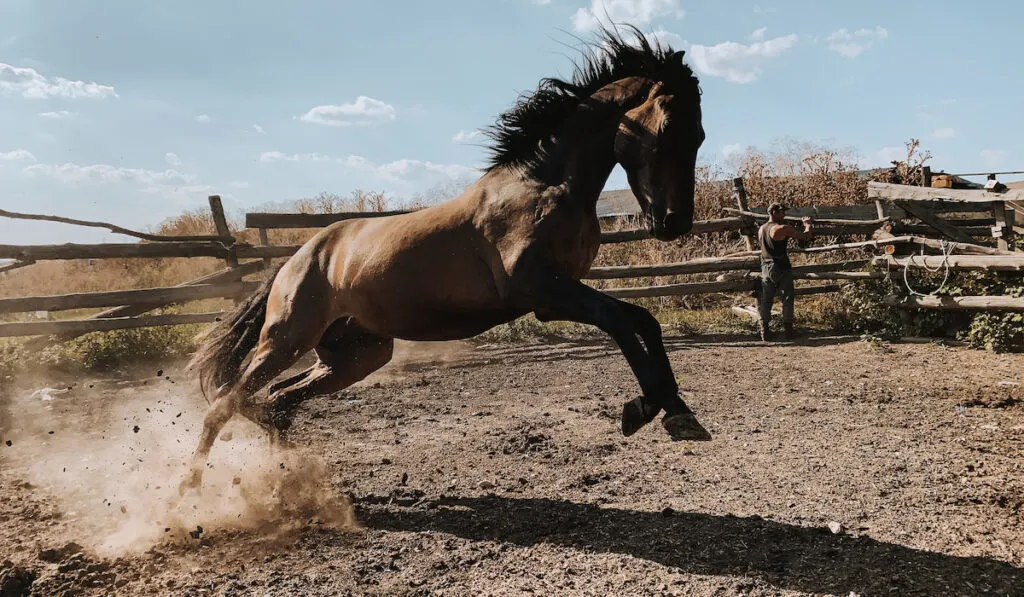
Possible Injuries from Horse Kicks
A horse’s kick is extremely powerful and can cause severe, even fatal injuries. Many riders have experienced broken bones, deep lacerations from a hoof, and even cardiac arrest if the kick landed on their chest. It is also extremely possible to suffer from head injuries that can be fatal if the impact was extreme.
Many people have long-lasting effects from horse kick-related injuries and need long term care to heal from them. Ask any experienced equestrian about the horror stories they have experienced due to horse kicks; they will definitely the possible kick related injuries that can occur if you aren’t careful around horses.
Other horses can even suffer debilitating injuries from horse kicks and small animals can be hurt or easily killed by the power of a horse kick. The strength behind their legs is so massive and potentially devastating that is tremendously important that a rider prevent horse kicks whenever the situation allows.
How to Stay Safe Around Horses
In order to keep you, your horse and others safe, you must always be vigilant about your own actions and the actions of others. Granted, there are some accidents that cannot be prevented, but for the most part, you can easily prevent the majority of horse kicks from happening around you.
Be Aware of Your Surroundings
If you notice an out of control horse, try to keep your horse away from it. If a dog or cat, or other animal gets near your horse’s personal space, try your best to remove it or your horse from the situation.
Try Not to Walk Behind a Horse Unless It Is Warranted
Before walking behind your horse, put your hand on your horse’s neck and run it along the horse’s hindquarters as you walk slowly around it. This lets your horse know what you are doing and reminds them that it is you behind them and not a stranger or predator. Be sure to stay close to your horse as you do this, the closer you are, the less power they can kick you with.
Wear a Helmet, Even When Just Working on the Ground
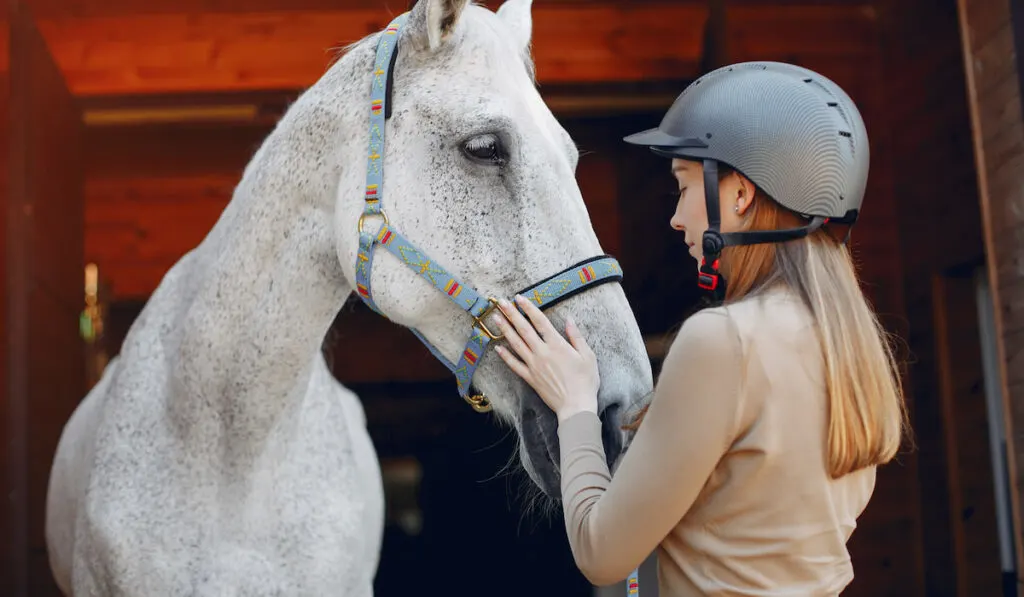
These helmets can help to lessen the impact from a kick and possibly prevent a fatal injury. A lot of equestrians will only use helmets when mounting but, head injuries are possible even when on the ground. Aside from the risk of a kick, horses can also strike out with their front hooves and potentially hit your head.
Never Put Yourself in an Enclosed Area with Your Horse If You Can Avoid It
Standing behind a horse in a stall or enclosed trailer can be extremely dangerous if they were to kick. You could potentially get pinned by them or suffer a severe injury getting slammed against a hard surface.
Knowing the power of a horse kick and the potentially life-threatening injuries that one can suffer is not meant to dissuade someone from enjoying the company of a horse. The love a horse is to respect their power and admire their magnificence.
Keeping horses safe and preventing dangerous situations should be your number one goal. The more training a horse has on the ground as well as exposure to different situations, the less likely it is to kick out of fear. When you are horses, even your own horse you you think is safe, it is best to follow safety guidelines just as you would if you are a new rider. If you always do that, you can truly enjoy horseback riding and make it a safe, unforgettable experience for both of you.

